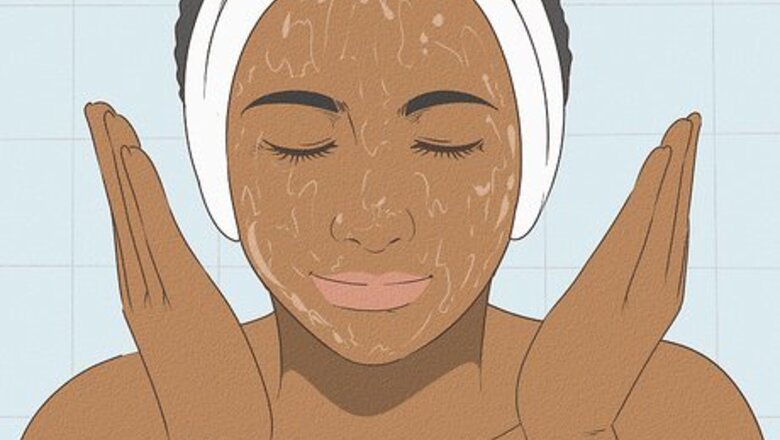
views
Waking Yourself Up
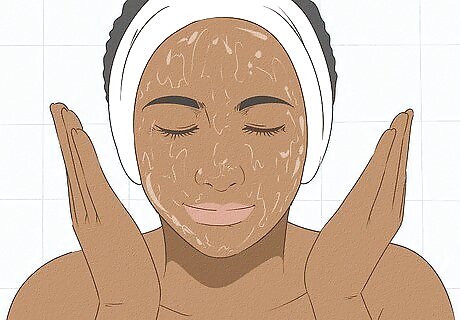
Splash yourself with cold water. If you're feeling sleepy, splash some cold water on your face. To further wake up, step outside with your face still damp. Cold water gets the blood flowing, so it helps wake you up. If you have the time, try taking a cold shower. A contrast shower, where you switch back from warm and cold water, can also help wake you up and energize you.
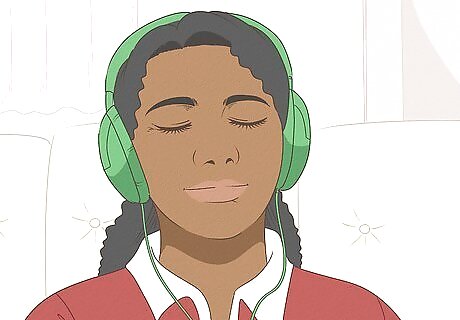
Listen to music. Music can help keep you awake and energized when you're feeling sleepy. It also helps lift your bad mood. You can listen to loud music, but it's not necessary. Any music that engages you will get your brain working and help keep you awake.
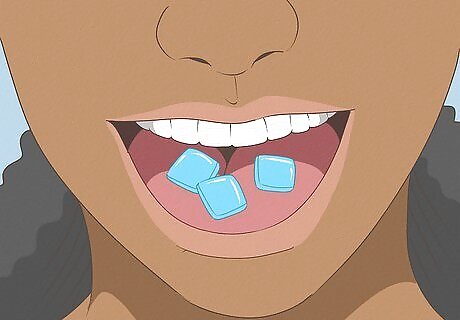
Eat mint. Mint flavored items can help refresh and wake you up. Chew some mint-flavored gum or suck on a peppermint.
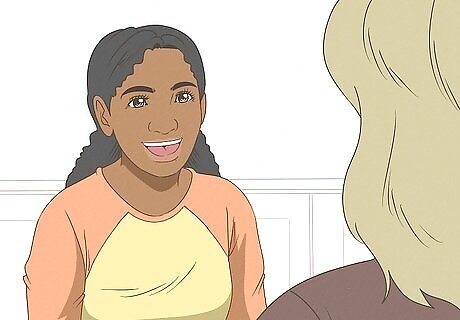
Talk to someone. Involve yourself in conversation to help stimulate your mind and wake yourself up. If you're at work, go talk to a colleague about a work-related topic. Find a study buddy when studying late and discuss the information to help keep you awake. Try calling a friend or family member for a brief 5-minute chat to wake you up.
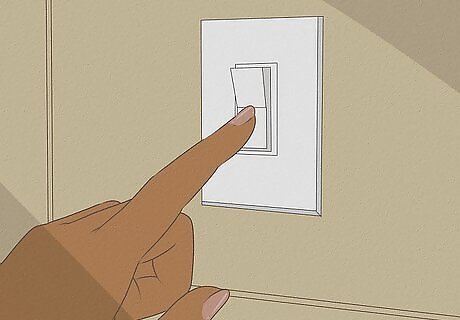
Turn on lights. Dimmer lights can cause fatigue by making your body think it's almost time to sleep. Dimmer lights also boost relaxation, which can make you feel sleepy. Turn on brighter lights to help fight sleepiness.
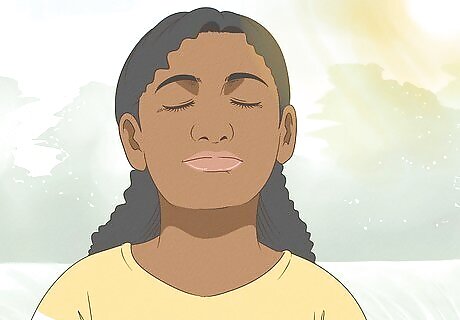
Get sunlight. Getting sunlight on a daily basis can help you get your natural circadian rhythms regulated. Try spending at least 30 minutes outside in the sunlight. If you can't spend 30 minutes outside, go outside and get some fresh air to help you re-energize.
Getting Active
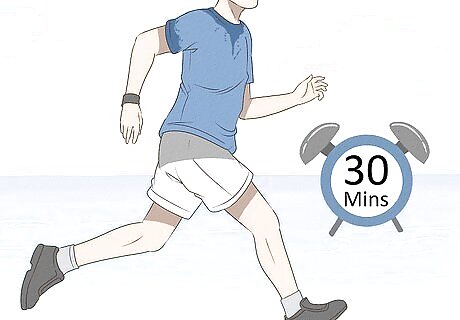
Exercise. Regular exercise helps boost energy levels and metabolism, and even helps the brain. You should incorporate 4-5 days of exercise into your regular routine to help keep you energized and strong. Make sure to exercise a few hours before bed so it doesn't interfere with your sleeping patterns. A study at the University of Georgia found that exercise was more effective than some medication to help boost energy and keep you awake. Regular exercise also helps improve the quality of your sleep. Try walking, cycling, swimming, or hiking. Do something each day for 30 minutes that gets your heart rate up.
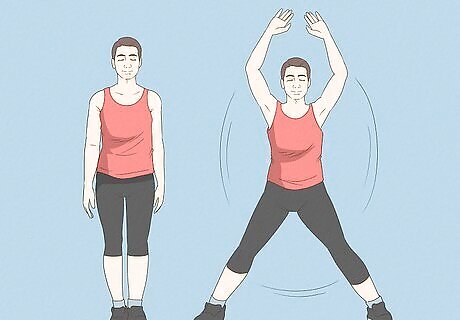
Move around. If you are sitting at your desk and feel like nodding off, try getting out of your chair and moving around. Take a walk around the office, do a few jumping jacks, run in place, or even do some squats and crunches. This helps get your blood pumping and wakes you up. A study at California State University found that a 10 minute walk kept you alert for 2 hours afterwards, while a candy bar only kept you alert for 1 hour and led to a crash afterwards. Stretch. Get out of your chair and touch your toes, stretch your back, and stretch your arms overhead.Stretching gets your blood flowing.
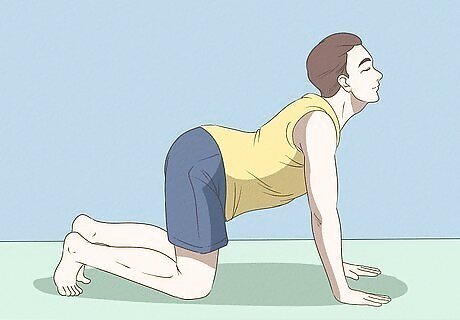
Do yoga. When sleepiness hits, try doing some simple yoga poses. Yoga can help warm up the body and work as a natural stimulant. Start with cat-cow pose. Get on your hands and knees with your shoulders and hips over wrists and knees. Move your spine rhythmically. With every inhale, arch the back and lift the sitting bones and chest. When you exhale, round the back and tuck your chin and pelvis. Start in downward facing dog. Lift your right leg up behind you. Round your spine while drawing the knee to your chest. Round your upper spine upwards as you keep the pelvis low. The right thigh should be against your chest and your knee should be against your nose. Return to downward facing dog. Repeat with the left leg.
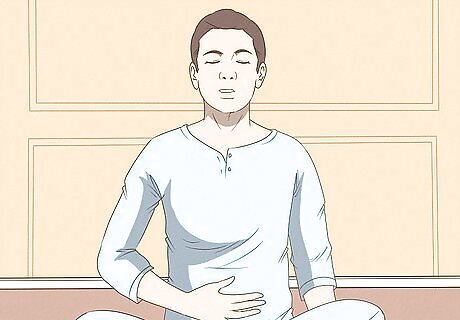
Breathe deeply. This raises oxygen levels in the blood and helps improve circulation. Breathe through your abdomen for the most effective deep breathing. Sit up straight. Place a hand on your belly. Inhale through your nose. Make sure your belly pushes your hand out while your chest doesn't move. Push the air out through your lips. Complete this exercise 10 times. Inhale and exhale quickly through your nose. Keep your mouth closed and relaxed. The breaths should be short. Then breathe normally. Try for 15 seconds, adding 5 seconds until you can do this for a minute.
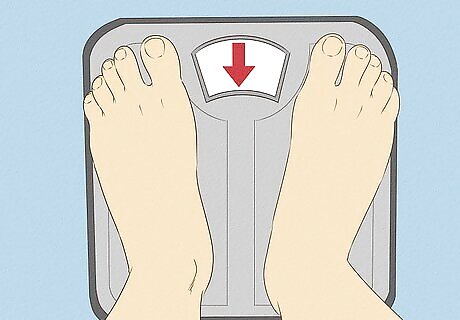
Lose weight. A study presented at the SLEEP 2012 conference found that obesity and excess weight gain caused daytime sleepiness. Diet and exercise can help lose weight, in addition to helping improve your energy levels.
Getting Proper Sleep
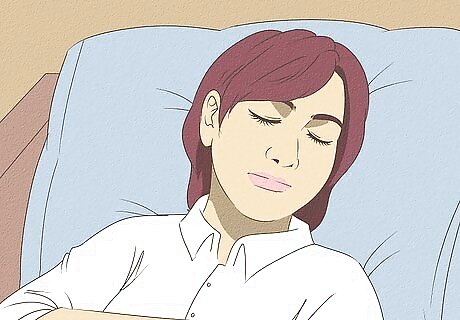
Take a nap. One great way to fight sleepiness is to take a nap. These naps should be short - 5 to 25 minutes - and well before your bedtime. Try to nap 6-7 hours or longer from your bedtime. If you can't take a nap, try closing your eyes and lying there while you rest for about 10 minutes. Try not to sleep too long. If you sleep more than 20-30 minutes, you won't get into a deep sleep or mess up your inner clock, both of which can make you feel groggy.
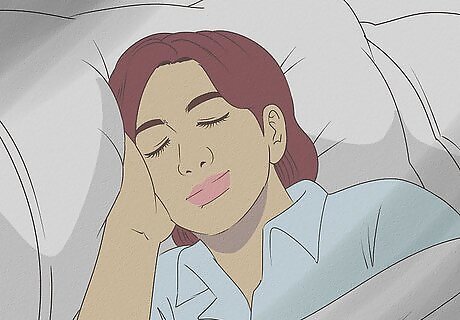
Get enough sleep. One of the main reasons you feel sleepy is because you don't get enough. You need to get 7-8 hours of sleep each night. Get on a sleep schedule so that your body can form a habit.
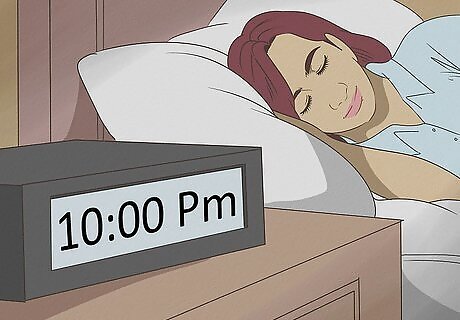
Sleep at the proper times. Sleep during the hours of 10 p.m. - 2 a.m. The body relaxes the most during those hours. If you stay up too late, your body's natural sleep rhythms can get out of balance. Plus, going to bed late might not give you the 7-8 hours you need.
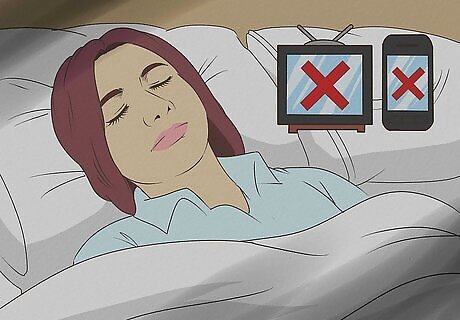
Get rid of distractions. One thing that can help you get proper sleep is to rid yourself of distractions in your room. This includes electronics such as cell phones, laptops, tablets, and televisions. You might be inclined to stay on the computer or cell phone too long, which cuts into your sleep time. Cut off all TVs and radios. If you need to sleep with sound in the background, try soothing music, sleep sounds like rain or thunderstorms, or small water fountains.
Fueling Your Body Properly
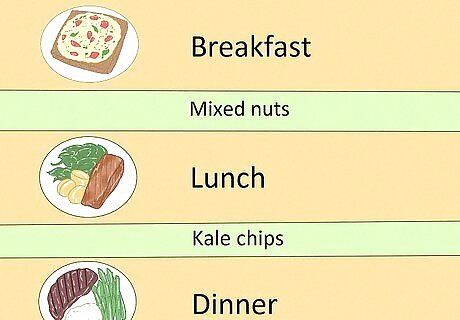
Eat an adequate amount of food. Not fueling your body can cause sleepiness and fatigue. By eating a balanced diet of at least 3 small meals a day, along with healthy snacks in between, you fight off fatigue by keeping your blood sugar levels in check. Eating throughout the day also helps you sustain your energy levels. Don't skip meals, especially breakfast. Start the day with protein and complex carbs instead of sugary foods. Too much sugar in the morning can cause you to crash later in the day. Try eggs and whole-grain toast.
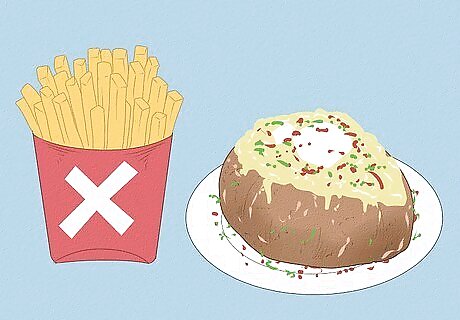
Reduce your fat intake. Diets with high concentrations of fat can make you sleepier during the day. A study done at Penn State University found participants who ate more fatty foods were sleepier during the day. Diets high in fat can also decrease alertness. Carbohydrates were found to help fight fatigue during the day. Diets high in protein also help give you sustained energy. Don't eat lunches with high concentrations of fat. Instead of fries, eat a baked potato.

Drink enough water. Dehydration can cause sleepiness. Drink water continuously throughout the day. On average, you need 6-8 cups of water a day. If you are doing any physical activity, have 2 cups of water before the activity and 2 more after. If you feel thirsty, you're already dehydrated and need to drink more water. Your urine should be a light color if you are drinking enough water.
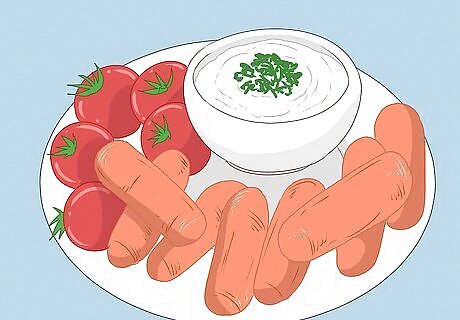
Reach for a healthy snack. Instead of getting a sugary snack, like a candy bar, eat a healthy snack. Snacks full of protein and other healthy ingredients will help give you lasting energy without the crash. Try peanut, almond, or cashew butter on apples, celery, whole wheat crackers, or a piece of whole wheat bread. Put some fresh fruit into Greek yogurt or unsweetened plain yogurt. Also try honey or nuts in it, too. Eat baby carrots, cucumbers, or cherry tomatoes with low-fat cream cheese dips. Eat avocado with tomatoes, nuts, or other vegetables.
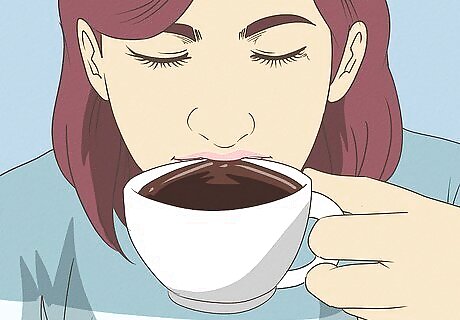
Drink caffeine. Caffeine helps you wake up by getting your heart pumping and stimulating your body. It also helps improve concentration and attention span. However, caffeine can be addictive and cause headaches and anxiety. Coffee is a common way people get caffeine. An average cup of coffee has 95-200 mg for an 8 ounce cup. Consuming coffee can give you "jitters" after you drink it, so you may want to limit your intake. Tea is another common way to get caffeine. Tea may be more effective at keeping you awake because in addition to caffeine, it has three other stimulants that work with caffeine: Theophylline, Theobromine, and L-theanine. Coffee gives you a kick after drinking it, whereas tea works continually through the day to keep you awake and alert. Tea won't give you that wired, jittery feeling after drinking it. In some individuals, caffeine can cause fatigue.
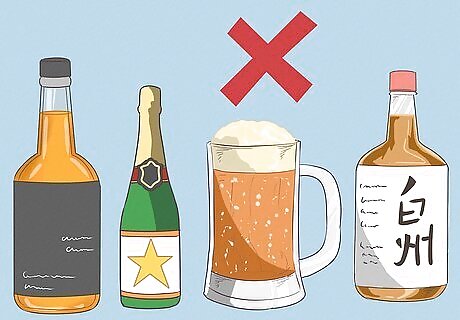
Refrain from drinking alcohol. Many people use alcohol to help them sleep. This might seem effective because you quickly fall asleep after drinking the alcohol. This is because it sedates your body. However, when the body starts to metabolize the alcohol, it overshoots, which can wake you up in the middle of the night. To help fight sleepiness the next day, don't drink alcohol to help you fall asleep the night before. Alcohol has been shown to disrupt sleep patterns, which can make you feel sleepy the next day.

















Comments
0 comment